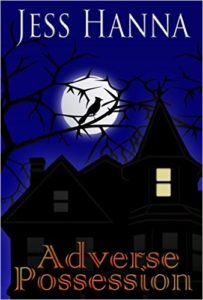Horror Has A Face
Bonus points if you know which movie the title comes from!
I’ve been reading Adverse Possession from Jess Hanna over the past few weeks and it’s given my imagination a lot to chew on. The premise is pretty straightforward – a normal family moves into a new house and supernatural strangeness starts happening. The haunted house story is hardly unique but Hanna goes about it in a way that’s different from other stories in the genre. The creepiness is subtle and not as nightmarish or sensational as, say, Richard Matheson’s Hell House. It’s pretty clear early on (even from the title of the book) that demonic possession is the root of the horror, but it’s not thrown in our faces in the same way as Peter Blatty’s The Exorcist. Hanna’s horror is more muted and chilling and, most importantly, realistic enough to worm its way into the reader’s brain.
I am not a huge fan of outright horror but I like my dishes smothered in a dark, creepy sauce. This is easy to see from my own writing. One thing that has always struck me when I’ve picked up a horror story is how well (or poorly) the writer relates the horror to me, the reader. I’ve never knowingly confronted a demon, I’ve never been chased through the woods by a monster, I’ve never cowered in a dark basement while hiding from a serial killer. I have a vivid imagination that is able to visualize what it might be like but I don’t have firsthand experience in these situations. Personally, I have found that horror I can relate to is often far more terrifying than anything my imagination can cook up.
I’ve only read one book by Stephen King – Pet Sematary. There was supernatural scariness in abundance, but the part that I couldn’t get out of my mind was *spoiler alert* the son being killed by the truck. I’ve never had to deal with zombie cats or Wendigo in the forest, but I have  children and I cannot imagine how horrific it would be to lose one of them in an accident like this. King latched onto a fear that most people in the world share – the death of a child – and used it as a springboard for the more far-fetched screams to come.
children and I cannot imagine how horrific it would be to lose one of them in an accident like this. King latched onto a fear that most people in the world share – the death of a child – and used it as a springboard for the more far-fetched screams to come.
This, in my opinion, is excellent use of horror. Everyone has things they fear – painful death, crippling injury, spousal infidelity, bankruptcy, abandonment, etc. Two things that I am especially fearful of are blindness and my house burning down. A good horror writer will pry the splinter under these fingernails and then lead your already-panicked mind into dark places that you never considered.
Books don’t have the same horror advantages that movies do. A book needs several words to describe a hideous face suddenly popping up out of the dark, but a movie can give you all of that in a fraction of a second. Books don’t have jarring music to make up scream and jump out of your seat (and if a book has made you do that, you’re a sissy). A good book will use your imagination against you, making you create the horror instead of just watch it.
And it all starts with something close to home.






































I’ve never really been a fan of horror. More times than not the story is either a glorification of evil, or it gives evil a power and position it doesn’t have. (Meaning, evil is so often portrayed as a power greater than good, such as Freddy or Jason being basically unstoppable.)
I realize that mainly speaks to secular tales, but even in the Christian market I find it hard to justify horror as a legit genre. It feeds those parts of us that we really ought not feed. (I have very good friends who are horror film fanatics, and they often talk about “loving” being scared watching these things at night.)
CS Lewis once argued that, yes, evil (specifically in children’s literature) ought to be as evil as possible, the threat ought to be great and terrifying, but only to show good as being stronger- to make the hero that much greater, and the victory that much sweeter. …That I can see.
I don’t know, I could be wrong, but I just cannot help but think that life is just too darn short to waste with stories of demon in dark rooms, slit throats, or armies of the flesh-eating dead.
But, that’s me.
Latching onto a known horror and using it to introduce an unknown, or larger horror. Great analysts and, if I may, great tip.
I’ve learned to appreciate horror, yet not as a standalone genre. I think horror elements in broader story contexts, such as the horror scenes in The Lord of the Rings or in novels or anime stories, comport more with reality.
See also: romance.
Agreed.
Still no takers for the movie quote article title?
Apocalypse Now.
I’m in the jungle….and I meet Raquel Welch…
Stephen King often talks about using a fear that many people have as the basis for generating fear in his books. For example, clowns and It (shudder). I can enjoy a creepy story now and again, but I just can’t read demonic ones. I guess because other scary stories I can dismiss as not-true (vampire, werewolves, for example) but demons I can’t, so the horror is just too close to home. And I basically much prefer a suspense story where the horror elements are more psychological than spelled out (a la Hitchcock). There are a few King novels I really enjoy, though, I have to admit.